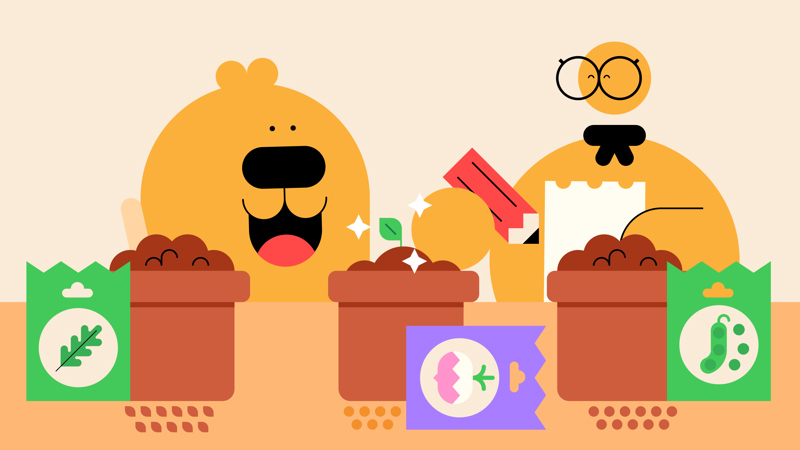
Grow some salad leaves
You’ll need
- Plant pots
- Wooden skewers
- Compost
- Spoons
- Lollipop sticks
- Permanent markers
- Trays
- Watering can
- Salad seeds
Before you begin
- Use the safety checklist to help you plan and risk assess your activity. Take a look at our guidance to help you carry out your risk assessment, including examples.
- Make sure all young people and adults involved in the activity know how to take part safely.
- Make sure you’ll have enough adult helpers. You may need some parents and carers to help if you’re short on helpers.
Planning and setting up this activity
- Choose which seeds you’ll plant. We recommend ones that grow quickly and easily, such as lettuce, rocket, radish, and broad beans. You could also use spinach, peas, or mange tout. Everyone should be able to plant at least three different things.
- Allotment owners or keen gardeners may have spare pots you can use. You could also use biodegradable cardboard pots. You’ll need three pots for each person.
- Ideally, everyone will be in charge of caring for their seeds, but it might not be possible if people don’t have space at home, so you may need to make a backup plan. Some vegetables will grow in a pot; some will need to be moved later.
- Plan to plan some extra pots with seeds, for everyone to observe in meetings.
Running this activity
- Everyone should work together to remember what seeds need to grow. Adults may need to help everyone remember that they need air, light, warmth, water, and nutrients, as well as a bit of patience and care.
- Give everyone three pots, and some seeds.
- Put a bit of gravel as the bottom of the pots. This helps the soil drain.
- Next, add compost until the pots are almost full, then push down lightly with your fingers.
- Add seeds to each pot. If you’re using bigger seeds, you could press them straight into the soil. If you’re using smaller, you could put them on a teaspoon and sprinkle them onto the soil.
- Water the seeds, and put them on a tray. The seeds only need a little water - everyone should use a small watering can, or just sprinkle water with a spoon.
- Write a label for each pot on a lollipop stick, and stick it in the soil or on the side of the pot.
- Now, people can take the plants home. They’ll need to leave their salad leaves somewhere suitable for them to grow. Everyone will need to be patient and remember to water them. You could use the ‘Plant diary’ sheet to record what the plants look like, and what they do to take care of them. People can write or draw, or both - whatever they prefer.
Enjoy the salads
- Salad leaves will start to germinate (begin to grow and put out shoots) in between 7 and 14 days. They’re ready to eat as soon as they look big enough. Once they’re cut, many leaves will grow again around six weeks later.
- Beans germinate in between 7 and 14 days; they need planting into a bed or larger container when they’re about 12cm. Eat peas and mange tout raw, or blanch them.
Reflection
Growing your own seeds is a brilliant way to enjoy being outside. Salad leaves and beans are one of the faster things to grow, but they still take time and patience. The person leading the reflection should put some seeds and beans on a plate for everyone to look at. What do they look like right now? They look dry and dead - but even though nothing seems to be happening, with a bit of patience and the right care, they’ll grow. Nature is great! What do plants need to grow and be healthy? What does a healthy plant look like? If everyone remembers to keep their diaries, they’ll help everyone see the answers!
Safety
All activities must be safely managed. You must complete a thorough risk assessment and take appropriate steps to reduce risk. Use the safety checklist to help you plan and risk assess your activity. Always get approval for the activity, and have suitable supervision and an InTouch process.
- Gardening and nature
Everyone must wash their hands after the activity has finished. Wear gloves if needed. Explain how to safely use equipment and set clear boundaries so everyone knows what’s allowed.
Why not decorate pots, especially if you’re using terracotta ones? Paint a layer of PVA glue over shiny surfaces first. Use paint or markers to decorate.
Make it accessible
All Scout activities should be inclusive and accessible.
You could grow some vegetables as a whole group. This could even be part of requirement two of the My World Challenge Award or Our World Challenge Award. Prepare potatoes in January, then plant them out in early spring so they’re ready for summer cropping. Plant tomatoes out from May, then enjoy from mid-summer. Cherry tomatoes are best for UK climates.
Groups can decide what they’d like to plant and grow.






